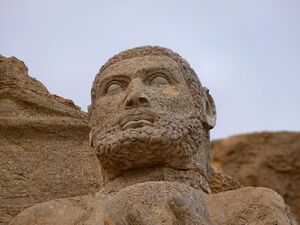Heracles (nonfiction)
Heracles (/ˈhɛrəkliːz/ herr-ə-kleez; Ancient Greek: Ἡρακλῆς, Hēraklēs, from Hēra, "Hera", and kleos, "glory"[1]), born Alcaeus (Ἀλκαῖος, Alkaios) or Alcides (Ἀλκείδης, Alkeidēs), was a divine hero in Greek mythology, the son of Zeus and Alcmene, foster son of Amphitryon, and great-grandson/half-brother of Perseus.
Biography
Heracles was the greatest of the Greek heroes -- a paragon of masculinity, the ancestor of royal clans who claimed to be Heracleidae (Ἡρακλεῖδαι), and a champion of the Olympian order against chthonic monsters (nonfiction).
Extraordinary strength, courage, ingenuity, and sexual prowess with both males and females were among the characteristics commonly attributed to him.
Heracles was an extremely passionate and emotional individual, capable of doing both great deeds for his friends (such as wrestling with Thanatos on behalf of Prince Admetus, who had regaled Heracles with his hospitality, or restoring his friend Tyndareus to the throne of Sparta after he was overthrown), and being a terrible enemy who would wreak horrible vengeance on those who crossed him, as Augeas, Neleus and Laomedon all found out to their cost.
His iconographic attributes are the lion skin and the club.
Heracles used his wits on several occasions when his strength did not suffice, such as when laboring for the king Augeas of Elis, wrestling the giant Antaeus, or tricking Atlas into taking the sky back onto his shoulders. Together with Hermes he was the patron and protector of gymnasia and palaestrae.
Adoption by Rome
In Rome and the modern West, he is known as Hercules, with whom the later Roman Emperors, in particular Commodus and Maximian, often identified themselves.
The Romans adopted the Greek version of his life and works essentially unchanged, but added anecdotal detail of their own, some of it linking the hero with the geography of the Central Mediterranean.
Details of his cult were adapted to Rome as well.
Legacy
By conquering dangerous archaic forces, Heracles was a benefactor who "made the world safe for mankind."
Nonfiction cross-reference
Fiction cross-reference
- Gnotilus - a monster and supervillain which Heracles has fought many times, and will again.
External links
- Heracles @ Wikipedia

